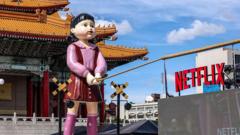As Yoon Suk Yeol's presidency concludes in controversy, he prepares for possible imprisonment amidst ongoing insurrection charges.
Yoon Suk Yeol's Political Struggles: Impeachment and Legal Challenges Ahead

Yoon Suk Yeol's Political Struggles: Impeachment and Legal Challenges Ahead
Former South Korean president faces severe legal implications following Constitutional Court decision.
Yoon Suk Yeol’s political saga has reached a critical juncture following his impeachment by the Constitutional Court, which upheld the decision to remove him from office last Friday. Once a prominent prosecutor, Yoon’s tenure as president faced a meteoric rise that ended abruptly due to his controversial decisions, particularly regarding his imposition of martial law. Currently, he stands accused of leading an insurrection related to these actions on December 3.
Prosecutors allege that during his brief proclamation of martial law, Yoon ordered a ban on all political activities and directed military leaders to forcibly enter the National Assembly, reportedly threatening to break down doors "with axes" or resort to gunfire if necessary. Yoon has continuously denied these insurrection claims, asserting that his martial law declaration was a critical measure to counteract what he considered "anti-state forces" within the government.
The implications of his recent impeachment do not directly alter the criminal proceedings against him. If convicted of insurrection, Yoon could be sentenced to a lengthy prison term. Reports suggest that should he be found guilty, it will not be unprecedented for South Korean leaders, as illustrated by the former president Park Geun-hye's path, who, after serving a significant portion of her prison sentence for bribery, was granted a pardon in 2021.
Supporters of Yoon have rallied, expressing their discontent and desire for his reinstatement. Yet, as the legal proceedings unfold, Yoon will confront the reality that the court's decision holds significant weight in shaping both his political legacy and personal freedom.
Prosecutors allege that during his brief proclamation of martial law, Yoon ordered a ban on all political activities and directed military leaders to forcibly enter the National Assembly, reportedly threatening to break down doors "with axes" or resort to gunfire if necessary. Yoon has continuously denied these insurrection claims, asserting that his martial law declaration was a critical measure to counteract what he considered "anti-state forces" within the government.
The implications of his recent impeachment do not directly alter the criminal proceedings against him. If convicted of insurrection, Yoon could be sentenced to a lengthy prison term. Reports suggest that should he be found guilty, it will not be unprecedented for South Korean leaders, as illustrated by the former president Park Geun-hye's path, who, after serving a significant portion of her prison sentence for bribery, was granted a pardon in 2021.
Supporters of Yoon have rallied, expressing their discontent and desire for his reinstatement. Yet, as the legal proceedings unfold, Yoon will confront the reality that the court's decision holds significant weight in shaping both his political legacy and personal freedom.






















